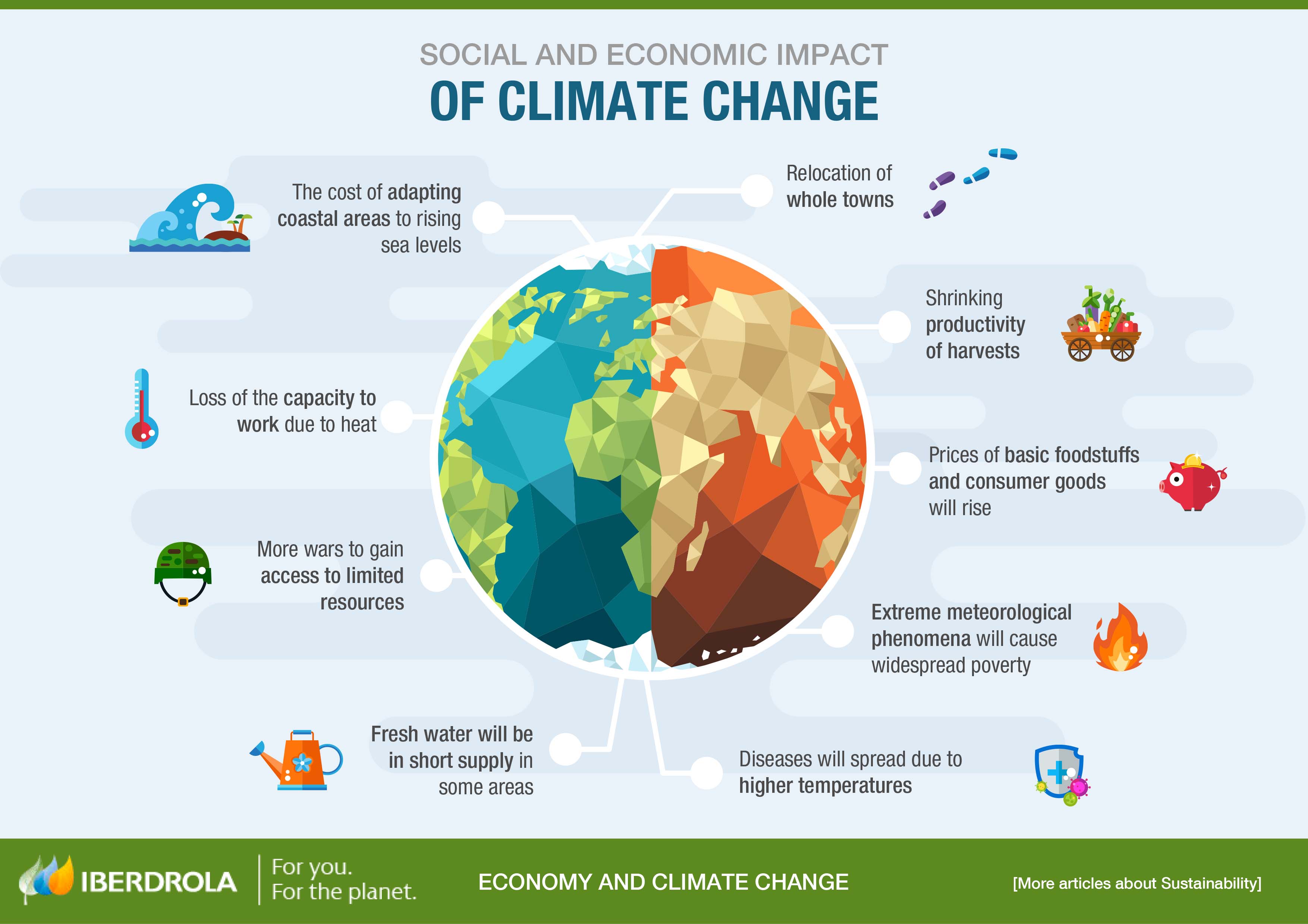Economic impacts of climate change
How is climate change affecting the economy and society?
Not only is it a serious threat to the planet and to people, climate change is also threatening the global economy. This problem needs public-private sector collaboration to change the way we produce goods to other methods that guarantee and drive the development of sustainable economic growth.

As well as its serious impact on the environment and people, climate change is one of the biggest threats to economic stability.Heatwaves make us less able to work and reduce productivity. Hurricanes, cyclones and typhoonsdevastate millions of people, leaving them in absolute poverty after ruthlessly sweeping away their communities. Droughtsshrink harvests, further complicating the arduous task of feeding the world population, which is expected to reach 10 billion by 2050 (World Population Prospects 2019, United Nations Organisation). The World Bank is warning: if we don't do something immediately, climate change could push 100 million more people into poverty by 2030.

SEE INFOGRAPHIC: The social and economic impact of climate change [PDF]
The Stern report and the Nordhaus model
Considered until not long ago something that didn't affect us, the health of the environment takes centre stage in the models of today's economists.
In 2006, the British government was the first to commission an economist to draft a report on the climate. It chose the World Bank's former chief economist, Nicholas Stern, and the result was a 700-page document that has become a reference on the subject. Stern confirmed that “greenhouse gas emissions are the biggest mistake that the world market has ever seen”. In short, the main conclusion of the Stern Report is that we need to invest the equivalent of 2% of global GDP to mitigate the impact of climate change.
Meanwhile, American economist William D. Nordhaus received the Nobel Prize for Economics in 2018 with Paul Romer for integrating climate change into long-term macroeconomic analysis. Nordhaus was the first economist to develop a quantitative model that reproduces the interaction between economic development and climate change on a global scale. According to Nordhaus, the solution to climate change is to apply prices that will act as a deterrent to using fossil fuels, because the current price is too low and does not foster the search for alternatives like renewable energies.
Is it possible to halt climate change and boost the economy?
Despite the initial reticence of the business community, an increasing number of studies and activities show that measures aimed at dealing with global climate change are a golden opportunity for ensuring sustainable development and driving economic growth. As explained by the World Commission on the Economy and Climate in a report at the end of 2018, adopting ambitious climate measures may generate profits of USD$26 billion by 2030, creating 65 million new jobs with low carbon emissions.
According to this report, to build a more resilient, beneficial growth model for people we must accelerate structural transformation in five key economic sectors:
Clean energy systems
Decarbonisation of the energy system coupled with decentralised, digitised electrification technologies could give a billion more people access to modern energy services.
Smarter urban developments
More compact, connected and coordinated cities would save US$ 17 billion by 2050 and stimulate economic growth by improving access to work and housing.
Sustainable land use
A switch to more sustainable farming methods combined with strict forestry protection could generate economic benefits of around 2 billion dollars per year.
Smart water management
In areas with a water shortage, GNP could fall by up to 6% in 2050. This could be prevented by making more efficient use of water through technological improvements and investment in public infrastructure.
Circular industrial economy
Today, 95% of the value of the material from plastic packaging - up to 120 billion dollars a year - is lost after the first use. Policies that encourage more circular and efficient use of materials could improve global economic activity and reduce waste and pollution.
At the same time, the Global Commission on the Economy and Climate is urging public and private sector leaders to take these urgent measures in the next two or three years: put a price on carbon and force companies to disclose climate-related financial risks, speed up investment in sustainable infrastructure, harness the power of the private sector, boosting innovation and increasing the transparency of the value chain, and adopt a people-centric focus to ensure equitable growth and a fair transition.
The United Nations Organisation (UNO) says that it is not too late to turn around climate change and minimise its terrible effects. The truth is that humankind has the organisational and technological capacity to counteract and solve all the problems and damage we have done to the planet, and repair the harm caused to nature .
.
Circular economy model at the Iberdrola Group
At Iberdrola, we work to be more respectful of nature in our three strategic sustainability areas: climate action, biodiversity protection, and circular economy.
For this reason, our sustainable business model is based on the circular economy model, a system for making the most of resources in which priority is given to reducing the use of new raw materials through efficiency in processes, product life extensions, and a firm commitment to the reuse and recycling of materials.




